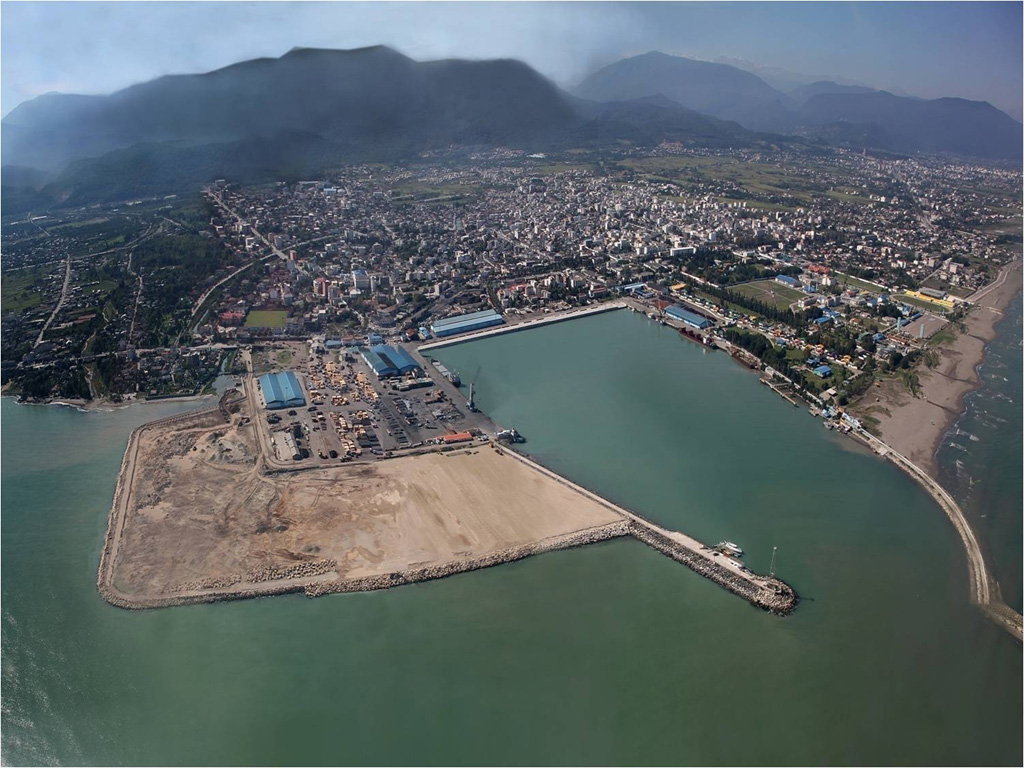On December 3, Iranian President Hassan Rouhani inaugurated the first phase of a major extension to its southeastern seaport of Chabahar. Tehran hopes the port extension to Iran’s key Arabian Sea outlets in the Gulf of Oman, costing $1 billion, will help Iran become a key transit route to landlocked Afghanistan and Central Asia.
The port is also expected to become a key point along the 7,200 km (4,474 mi) International North–South Transport Corridor (INSTC), a network of ship, road and rail routes that will move cargo between India, Afghanistan, the Caspian and Central Asia regions, and Europe.
Tense relations between Islamabad and New Delhi do not allow India to transport goods through Pakistan to Afghanistan and other Central Asian nations. Chabahar provides India with a viable trade route into the heart of Asia.
“This port has a special position and situation, which can shorten the North-South Corridor and connect it to the ocean. This corridor is and its operation is very important for the economy,” President Hassan Rouhani said at the inauguration of the port.
India has been closely working with Afghanistan and Iran to create reliable access routes for trade with Central Asian nations, bypassing its historic rival and neighbor Pakistan. In 2016, India, Iran and Afghanistan signed a contract to jointly set up a trade route for land-locked Central Asian countries. New Delhi committed around $500 million for the development of the Chabahar Port and associated roads and railway lines.
"Neighboring countries east of Iran, like Afghanistan and our northern neighbors in Central Asia, are connected to southern Iran and the open waters and the ocean through this corridor, and this matters politically to us and will develop our relations with eastern and northern countries and even Europe in the future," Hassan Rouhani added.
The Chabahar port, located in Iran’s restive Sistan-Baluchestan province in the far east of the country and bordering Pakistan, is easily accessible from India's western coastline. Mumbai forms the southern hub of the INSTC.
Chabahar is thought to become a counter to Pakistan's Gwadar Port, which has been under construction with heavy investments from China. Iran denies that Chabahar, located just 100 km (62 mi) from Gwadar, was not being developed to compete with Gwadar.
Under the May 2016 agreement between India and Iran, India is to equip and operate two berths in Chabahar port’s Phase One, with capital investment of $85.21 million and annual revenue expenditure of $22.95 million through a 10-year lease.
In his remarks on Sunday Rouhani also noted the plight of Iranian Baluch people in Sistan-Baluchestan province, which is underdeveloped and known for separatists movements. Rouhani said that Chabahar connects the region to Iran’s railway lines and can create an even better conditions for the region and its people.
"In designing this port, five piers will be put into operation and more than 200 hectares of new land will generate employment for the people of this province, and also bring Iran closer to other countries," Rouhani said.
India’s State Minister for Shipping Pon Radhakrishnan was in attendance for the commissioning of Phase One of the Shahid Beheshti Port at Chabahar, which was also attended by ambassadors and senior regional officials from 17 countries.
A ministerial-level meeting between representatives from Afghanistan, India and Iran was held on the sidelines of the event, where the three sides committed to working towards connecting national infrastructures, including ports, roads and railway networks to create greater opportunities for regional market access and economic integration.
Tehran hopes to link the Indian Ocean port with a railway that cuts through Zahedan, along the Pakistani border, up to Mashhad in Iran’s northeast. The project, designed to facilitate trade with Afghanistan and Central Asia, has been slow to get off the ground owing to a number of restrictions, including the embargo against Pakistan.
“Chabahar will soon become an important commercial hub for Iran,” Transport Minister Abbas Akhoundi said at the ceremony.
In October, India sent its first consignment of wheat to Afghanistan through Chabahar, expected to be fully operational by the end of 2018. The port can accommodate giant ships up to a dry weight of 120,000 tons.







 Azerbaijan and Armenia started the process of demarcation of their border on Tuesday, with the installation of the first border markers based on ge...
Azerbaijan and Armenia started the process of demarcation of their border on Tuesday, with the installation of the first border markers based on ge...
 President Aliyev emphasized the critical role of the North-South Transport Corridor in fostering transport cooperation between Azerbaijan and Russi...
President Aliyev emphasized the critical role of the North-South Transport Corridor in fostering transport cooperation between Azerbaijan and Russi...
 Armenian sappers commenced on Monday mine-clearance operations in the territories adjacent to the Saint Mary Church in village of Voskepar (Armenia...
Armenian sappers commenced on Monday mine-clearance operations in the territories adjacent to the Saint Mary Church in village of Voskepar (Armenia...
 Russian Foreign Minister Sergei Lavrov has reasserted that Moscow has no intentions to stop the fighting in Ukraine, even if peace talks commence.
Russian Foreign Minister Sergei Lavrov has reasserted that Moscow has no intentions to stop the fighting in Ukraine, even if peace talks commence.



